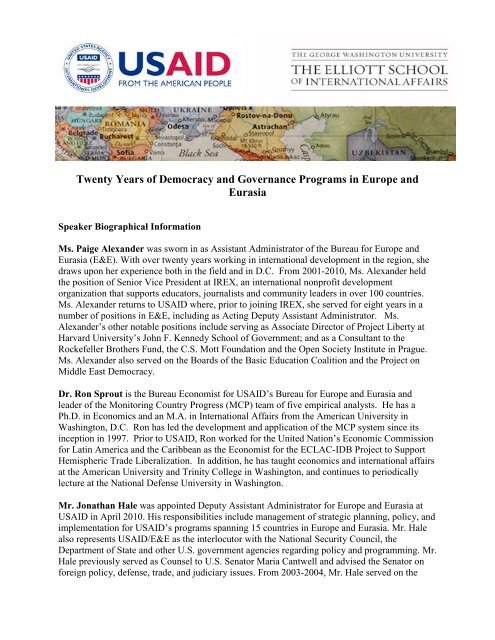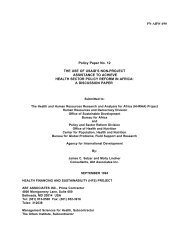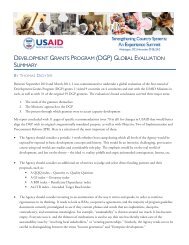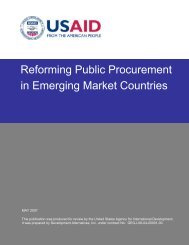Speaker Bios
Speaker Bios
Speaker Bios
Create successful ePaper yourself
Turn your PDF publications into a flip-book with our unique Google optimized e-Paper software.
Twenty Years of Democracy and Governance Programs in Europe and<br />
Eurasia<br />
<strong>Speaker</strong> Biographical Information<br />
Ms. Paige Alexander was sworn in as Assistant Administrator of the Bureau for Europe and<br />
Eurasia (E&E). With over twenty years working in international development in the region, she<br />
draws upon her experience both in the field and in D.C. From 2001-2010, Ms. Alexander held<br />
the position of Senior Vice President at IREX, an international nonprofit development<br />
organization that supports educators, journalists and community leaders in over 100 countries.<br />
Ms. Alexander returns to USAID where, prior to joining IREX, she served for eight years in a<br />
number of positions in E&E, including as Acting Deputy Assistant Administrator. Ms.<br />
Alexander’s other notable positions include serving as Associate Director of Project Liberty at<br />
Harvard University’s John F. Kennedy School of Government; and as a Consultant to the<br />
Rockefeller Brothers Fund, the C.S. Mott Foundation and the Open Society Institute in Prague.<br />
Ms. Alexander also served on the Boards of the Basic Education Coalition and the Project on<br />
Middle East Democracy.<br />
Dr. Ron Sprout is the Bureau Economist for USAID’s Bureau for Europe and Eurasia and<br />
leader of the Monitoring Country Progress (MCP) team of five empirical analysts. He has a<br />
Ph.D. in Economics and an M.A. in International Affairs from the American University in<br />
Washington, D.C. Ron has led the development and application of the MCP system since its<br />
inception in 1997. Prior to USAID, Ron worked for the United Nation’s Economic Commission<br />
for Latin America and the Caribbean as the Economist for the ECLAC-IDB Project to Support<br />
Hemispheric Trade Liberalization. In addition, he has taught economics and international affairs<br />
at the American University and Trinity College in Washington, and continues to periodically<br />
lecture at the National Defense University in Washington.<br />
Mr. Jonathan Hale was appointed Deputy Assistant Administrator for Europe and Eurasia at<br />
USAID in April 2010. His responsibilities include management of strategic planning, policy, and<br />
implementation for USAID’s programs spanning 15 countries in Europe and Eurasia. Mr. Hale<br />
also represents USAID/E&E as the interlocutor with the National Security Council, the<br />
Department of State and other U.S. government agencies regarding policy and programming. Mr.<br />
Hale previously served as Counsel to U.S. Senator Maria Cantwell and advised the Senator on<br />
foreign policy, defense, trade, and judiciary issues. From 2003-2004, Mr. Hale served on the
John Kerry Presidential campaign’s national security team. Mr. Hale was previously an attorney<br />
in the international group at former Secretary of State James Baker’s law firm - Baker Botts<br />
L.L.P. He counseled on various legal aspects of international business and represented clients<br />
developing energy projects and oil and gas pipelines in the Caucasus and Caspian Sea Regions.<br />
He also worked for U.S. Senate Majority Leader George J. Mitchell in the early 1990s. Mr. Hale<br />
graduated magna cum laude from Bates College with a B.A. in Political Science and was<br />
appointed to Phi Beta Kappa. He studied abroad at Moscow State University and Kharkiv State<br />
University in Ukraine. Mr. Hale received a J.D./ M.A. (International Affairs) from American<br />
University. He is a member of the District of Columbia Bar.<br />
Dr. Henry E. Hale is an Associate Professor of Political Science and International Affairs and is<br />
Director of the Institute for European, Russian, and Eurasian Studies (IERES), its Petrach<br />
Program on Ukraine, and the Program on New Approaches to Research and Security in Eurasia<br />
(PONARS Eurasia). His writings focus on issues of ethnicity, democracy, and international<br />
integration, and he is the author of the books The Foundations of Ethnic Politics: Separatism of<br />
States and Nations in Eurasia and the World (Cambridge University Press, 2008) and Why Not<br />
Parties in Russia Democracy, Federalism and the State (Cambridge University Press, 2006),<br />
winner of the American Political Science Association's Leon D. Epstein Outstanding Book<br />
Award for 2006 and 2007. He is also co-editor of the book Developments in Russian Politics 7<br />
(Duke University Press, 2010). His articles have appeared in a variety of journals, with his piece<br />
"Divided We Stand" (World Politics, 2003) winning the APSA's Qualitative Methods Section's<br />
Alexander George Award. He spent 2007-2008 on a Fulbright Scholarship in Moscow working<br />
on a new book, Great Expectations: The Politics of Regime Change in Eurasia, which he is<br />
currently writing up. Prior to joining GW, he taught at Indiana University (2000-2005), the<br />
European University at St. Petersburg, Russia (1999), and the Fletcher School of Law and<br />
Diplomacy (1997-98). He has also served as coordinator of party-building programs at Harvard's<br />
Strengthening Democratic Institutions Project (1998-2000) and editor of the Russian Election<br />
Watch (1999-2000 and 2003-04). Dr. Hale earned his Ph.D. from Harvard University in 1998.<br />
Dr. Andrew Green is the president of DGMetrics, Inc., a small business specializing in applied<br />
research, strategic assessments, and rigorous monitoring and evaluation. He has conducted<br />
extensive research on post-communist civil societies, including a dissertation examining the<br />
democratic effect of civil society engagement in policymaking processes, a quantitative indicator<br />
based on features of non-profit law, the Johns Hopkins Non Profit Sector Project, and a Wilson<br />
Center-funded grant analyzing the role of private and governmental donors in post-communist<br />
democracy assistance. In addition, Dr. Green created and taught a graduate course on democracy<br />
assistance at Georgetown University. He was also a senior partner on the DG Office’s recent<br />
political party assistance project, and in conjunction with RTI developed an indicator measuring<br />
the quality of election administration. DGMetrics is an organizational partner with the Solidarity<br />
Center on its five-year Global Labor Program, which includes quasi-experimental evaluation,<br />
and a soon-to-be protégé of the East-West Management Institute.<br />
Ms. Amber B. Brooks is the Civil Society Advisor to the Bureau for Europe and Eurasia at<br />
USAID. In this capacity, Ms. Brooks supports the USAID Missions in Europe and Eurasia<br />
through short term technical assistance around civil society programming. Amber serves as the<br />
editor of the NGO Sustainability Index, which measures the NGO environment in Europe &<br />
Eurasia and manages USAID’s contribution to the The Black Sea Trust for Regional
Cooperation which awards small grants to promote civic participation in the greater Black Sea<br />
region. Before starting with USAID in 2005, Ms. Brooks worked at the Brookings Institute on<br />
the Volcker Commission’s National Commission on Public Service, was an independent<br />
program evaluator for a local non-profit organization and served as Peace Corps volunteer in<br />
Orastie, Romania where she worked with civil society at the municipal level. Ms. Brooks has a<br />
Master’s degree in Public Administration – with an emphasis in international development and<br />
program evaluation – from The George Washington University.<br />
Ms. Jeanne Bourgault is the President of Internews. In this capacity, she leads the strategic<br />
management of the organization and its programs in some 40 countries around the world.<br />
Bourgault previously served as Internews’ Chief Operating Officer; she joined Internews in 2001<br />
as Vice President for Programs. Bourgault has overseen Internews’ growth in areas underserved<br />
by local media, including Afghanistan, where Internews has supported the development of more<br />
than 35 local, independently operated radio stations throughout the country, a Kabul-based<br />
national news service, more than ten regional multimedia centers, and an independent local<br />
journalism training institution, all in a previous vacuum of local media. Under Bourgault’s<br />
leadership, Internews has led the sector in focusing on the need for information amid crises,<br />
working to support local news and information access for communities affected by disaster,<br />
including the 2005 Asian Tsunami and the 2010 Haiti earthquake. Prior to Internews, Bourgault<br />
worked internationally in countries undergoing dramatic shifts in media and political landscapes.<br />
Bourgault worked in the former Yugoslavia, serving as a strategic advisor for media<br />
development programs in post-war Kosovo, as well as manager of community development<br />
projects in Serbia and Montenegro through the fall of Slobodan Milosevic. She served for six<br />
years with the U.S. Agency for International Development, including three years working on<br />
Latin America programs followed by three years at the U.S. Embassy in Moscow. Bourgault has<br />
consulted on international program design and evaluation for the Open Society Institute, the<br />
Rockefeller Brothers Fund, the Charles Stewart Mott Foundation, the Ford Foundation, the<br />
Research Triangle Institute, and the United Nations Centre for Human Rights, among others.<br />
Bourgault speaks very rusty Russian and holds a Master of Arts in International Studies and a<br />
Masters in Public Affairs from the University of Washington.<br />
Ms. Meg Gaydosik is the Senior Media Development Advisor in the Europe and Eurasia Bureau<br />
at USAID/Washington. In this capacity, Ms. Gaydosik provides advice and assistance to USAID<br />
Missions and policymakers on indigenous media development programming, freedom of<br />
expression and access to information issues. Prior to joining USAID in 2006, Ms. Gaydosik<br />
worked for 11 years as an on-site media development consultant and/or project manager in most<br />
of the Balkan and former Soviet Union countries. She has comprehensive skills in media<br />
management, operations and community relationship building, as well as internationally<br />
recognized expertise in the business, regulatory and content production aspects of media<br />
development. She was awarded a Knight International Press Fellowship (2003-2004), serving in<br />
Hungary, Romania and Slovakia. Gaydosik is a former commercial television station manager<br />
from Fairbanks, Alaska and holds a B.S. from Edinboro State University.<br />
Dr. Eric McGlinchey is an Associate Professor of Government and Politics at George Mason’s<br />
Department of Public and International Affairs. Prior to joining George Mason University in<br />
August 2005, Dr. McGlinchey held positions as an Assistant Professor of Politics at Iowa State<br />
University (2003-05) and as a Postdoctoral Fellow in Central Asian Studies at Stanford
University (2002-2003). Dr. McGlinchey's areas of research include comparative politics,<br />
Central Asian regime change, political Islam, and the effects of Information Communication<br />
Technology (ICT) on state and society. Grants from the National Science Foundation, the<br />
National Council for Eurasian and East European Research, and the Social Science Research<br />
Council have founded his research. Dr. McGlinchey is author of Chaos, Violence, Dynasty:<br />
Politics and Islam in Central Asia (University of Pittsburgh Press, 2011). Dr. McGlinchey<br />
received his Ph.D. from Princeton University in 2003<br />
Dr. Lincoln Mitchell is an associate research scholar at Columbia University's Harriman<br />
Institute. Before joining Columbia’s faculty, Lincoln was a practitioner of political development<br />
and continues to work in that field now. In addition to serving as Chief of Party for the National<br />
Democratic Institute (NDI) in Georgia from 2002-2004, Lincoln has worked on political<br />
development issues in the former Soviet Union, Eastern Europe, the Caribbean, the Middle East,<br />
Africa and Asia. Lincoln also worked for years as a political consultant in New York City<br />
advising and managing domestic political campaigns. Dr. Mitchell’s current research includes<br />
work on US-Georgia relations, political development in the former Soviet Union, and the role of<br />
democracy promotion in American foreign policy. His book Uncertain Democracy: US Foreign<br />
Policy and Georgia’s Rose Revolution was published by the University of Pennsylvania Press in<br />
2008. His next book, The Color Revolutions, will be published in spring of 2012. He has also<br />
written articles on these topics in The National Interest, Orbis, The Moscow Times, the<br />
Washington Quarterly, The American Interest, Survival, the Central Asian Survey, The New<br />
York Daily News and Current History as well as for numerous online publications including the<br />
online sections of The Washington Post, New York Times, Radio Free Europe/Radio Liberty and<br />
Transitions Online. Lincoln has been quoted extensively in most major American, Georgian and<br />
Russian newspapers and appeared on numerous television and radio programs and podcasts, as<br />
well as in Russian and Georgian television. He is also a frequent blogger on The Huffington Post<br />
where he writes primarily about domestic politics in the US and on The Faster Times where he<br />
writes about US Foreign Policy and baseball. He is currently working on a book about the Color<br />
Revolutions in the former Soviet Union. Lincoln earned his Ph.D. from Columbia University’s<br />
department of political science in 1996.<br />
Dr. Sean Roberts is Associate Professor of the Practice of International Affairs and Director or<br />
the International Development Studies Program at George Washington’s Elliott School of<br />
International Affairs. Dr. Roberts is a cultural anthropologist with extensive applied experience<br />
in international development work. Having conducted ethnographic fieldwork among the<br />
Uyghur people of Central Asia and China during the 1990s, he has published extensively on this<br />
community in scholarly journals and in collected volumes. In addition, he produced a<br />
documentary film on the Uyghurs of Kazakhstan entitled Waiting for Uighurstan (1996) and is<br />
presently writing a book about the community. In 1998-2000 and 2002-2006, he worked at the<br />
United States Agency for International Development (USAID) in Central Asia on democracy<br />
programs, designing and managing projects in civil society development, political party<br />
assistance, community development, independent media strengthening, and elections assistance.<br />
Dr. Roberts received his Ph.D. from University of Southern California.<br />
Dr. Alexander Sokolowski serves as the Senior Political Processes Advisor to the Bureau for<br />
Europe and Eurasia at USAID, Washington. In this capacity, he provides advice and technical
assistance on elections assistance and political party development. Since January 2009, he has<br />
also served as the Acting Team Lead for Democracy and Governance in the Bureau for Europe<br />
and Eurasia. Prior to joining USAID in June 2003, he taught Comparative Politics at George<br />
Washington University as an adjunct professor. He received his Ph.D. in Politics from Princeton<br />
University in November 2002, writing his dissertation on the structural and political<br />
determinants of fiscal and social policy failure in Yeltsin’s Russia. He has served as a Foreign<br />
Policy Research Fellow at the Brookings Institution (2000-2001). He also holds master’s degrees<br />
from Princeton (2000) and the Fletcher School of Law and Diplomacy (1994), and a B.A. from<br />
Amherst College (1991). Through the mid to late 1990s, he worked for the National Democratic<br />
Institute’s Moscow office as a Political Party Program Officer and Political Analyst. Fluent in<br />
Russian, he has published articles on Russian politics in academic journals (Europe-Asia Studies,<br />
Demokratizatsiya) and opinion pieces (The Moscow Times).<br />
Dr. George Gavrilis is Executive Director of the Hollings Center for International Dialogue in<br />
Washington, DC and senior research scholar at Columbia University in New York. His research<br />
is in the fields of border management, international assistance to post-conflict states, and politics<br />
and economy of the Middle East and Central Asia. In 2008-09, Dr. Gavrilis served as an<br />
International Affairs Fellow with the Council on Foreign Relations and worked with the United<br />
Nations on various policy initiatives on Central Asia and Afghanistan. He previously taught<br />
international relations and comparative politics in the Department of Government at the<br />
University of Texas-Austin, directed research for the CFR Oral History Project at Columbia<br />
University, and served as a National Security Postdoctoral Fellow at the Olin Institute for<br />
Strategic Studies at Harvard University. Dr. Gavrilis is author of The Dynamics of Interstate<br />
Boundaries (Cambridge University Press, 2008) and has published articles in Foreign Affairs and<br />
The New York Times on Turkey, Iran, Afghanistan, Israel and the West Bank.<br />
Dr. Gerald F. (“Jerry”) Hyman has been Senior Advisor at the Center for Strategic and<br />
International Studies and the President of its Hills Program on Governance since 2007. From<br />
2002 to 2007, he was the director of the US Agency for International Development’s global<br />
Office of Democracy and Governance a senior management position. Between 1990 and 2002,<br />
he held a number of posts at USAID dealing with democracy and governance, including (from<br />
2001 to 2002) a USAID Senior Management Group position as director of the Office of<br />
Democracy, Governance and Social Transitions in the Bureau for Europe and Eurasia. He<br />
developed the programming strategy paradigm for USAID democracy and governance<br />
assistance. From 1985 to 1990, he practiced corporate law at Covington & Burling in<br />
Washington DC. Between 1970 and 1982, he taught in the Department of Sociology &<br />
Anthropology at Smith College. He also taught courses at Williams College. He holds a BA in<br />
Philosophy and a Ph.D. in Anthropology from the University of Chicago and a JD from the<br />
University of Virginia. He is the author of numerous articles and publications. He is a member<br />
of the Advisory Board of National Endowment for Democracy’s Center for International Media<br />
Assistance and of the American Bar Association’s CEELI/MENA Advisory Board.<br />
Dr. Eric Rudenshiold is the Senior Officer in Charge for Central Asia and Kyrgyzstan in the<br />
USAID Asia Bureau and prior to that served as the Senior Governance and Anticorruption<br />
Advisor in the Europe and Eurasia Bureau at USAID/Washington. Dr. Rudenshiold provides<br />
topical advice and assistance on transitional development issues to USG policymakers. He also
currently teaches graduate courses in democracy theory and post-Soviet development in the<br />
International Development Studies program at George Washington University’s Elliot School of<br />
International Affairs. Before joining USAID in Washington D.C., Dr. Rudenshiold held senior<br />
positions with a number of democracy implementers, as well as with the Organization for<br />
Security and Cooperation in Europe. Having lived and worked overseas for more than a dozen<br />
years, including in the former-Soviet Union, he has extensive experience across the Europe and<br />
Eurasia region. Dr. Rudenshiold has worked as a journalist and editor, has published in<br />
academic journals and appeared as a regional expert on democracy issues on the BBC, CNN<br />
International and PBS’s Lehrer Newshour. He has a B.A. awarded summa cum laude from<br />
Drake University in Journalism, an M.A. in Comparative Governance from the University of<br />
Virginia and a Ph.D. in International Relations from the University of Virginia. Dr. Rudenshiold<br />
speaks Russian and French.<br />
Dr. Rachel Kleinfeld is a non-resident associate of the Carnegie Endowment for International<br />
Peace, and the founding CEO of the Truman National Security Project. Her passion lies in issues<br />
at the interstices of national security, human security, and development. Rachel has consulted on<br />
rule of law reform for the World Bank, the European Union, the OECD, the Open Society<br />
Institute, and other institutions, and has briefed multiple U.S. government agencies. Her writings<br />
have appeared in Relocating the Rule of Law (Hart, 2009), Promoting Democracy and the Rule<br />
of Law: American and European Strategies (Palgrave, 2009), Promoting the Rule of Law: The<br />
Problem of Knowledge (Carnegie Endowment, 2006) and other publications. Named one of the<br />
Top 40 under 40 Political Leaders in America by Time magazine in 2010, Rachel has been<br />
featured in the New York Times, the Wall Street Journal, and other national television, radio, and<br />
print media. Rachel has worked in human rights and economic development in India, Israel, and<br />
Eastern Europe, and has served as an elections monitor in Pakistan and Bangladesh and currently<br />
serves on the State Department’s newly created Foreign Affairs Policy Board.<br />
Mr. Suren Avanesyan is the Senior Rule of Law Advisor in the Europe and Eurasia Bureau at<br />
USAID/Washington. Mr. Avanesyan provides technical guidance and policy advice to the<br />
Bureau, the field missions and the US Government on issues relating to the justice sector reform<br />
efforts in the former Soviet Union and the countries of Eastern and Central Europe. Prior to<br />
joining USAID, Mr. Avanesyan worked in several for-profit and not-for-profit international<br />
development organizations in Washington, DC, where he designed, implemented, assessed and<br />
evaluated rule of law programs in Eastern Europe, Africa and Asia. He was a home office<br />
director of the USAID Justice Sector Reform Activity—a project that saw the transition of<br />
Kosovo from an international protectorate to an independent country resulting in creation of the<br />
brand new Ministry of Justice and Judicial Council. Mr. Avanesyan also managed projects in<br />
Serbia, Azerbaijan, Mongolia and Egypt and worked on ROL assessments and evaluations in<br />
several post-communist countries. A native of Russia, Mr. Avanesyan practiced law in Russia as<br />
a member of the Union of Advokats of Russia, and is fluent in Russian. After coming to the<br />
United States in 1995, he completed his MA (1998) and JD (1999) at the University of<br />
Wisconsin-Madison and LL.M. in International Legal Studies (2001) at New York University<br />
School of Law. He has published articles on international human and constitutional rights, child<br />
trafficking, and issues of civil liability in international law.
Dr. Sarah E. Mendelson currently serves as Deputy Assistant Administrator in USAID’s<br />
Bureau for Democracy, Conflict and Humanitarian Assistance (DCHA) responsible for<br />
Democracy, Human Rights and Governance. She joined the Obama administration in this role in<br />
May 2010. Prior to her current position, Dr. Mendelson was the Director of the Human Rights<br />
and Security Initiative at the Center for Strategic and International Studies (CSIS). She has<br />
worked for nearly two decades on a wide variety of issues related to human rights and<br />
democracy including in Moscow as a program officer with the National Democratic Institute in<br />
1994 and 1995. Before coming to CSIS, she was a professor of international politics at the<br />
Fletcher School of Law and Diplomacy at Tufts University. At CSIS, she conducted over a<br />
dozen public opinion surveys in Russia, tracking views on Chechnya, HIV/AIDS, military and<br />
police abuse, religious identity in the North Caucasus, as well as knowledge and experiences<br />
with human trafficking. She has researched the links between human trafficking and<br />
peacekeeping operations in the Balkans, and her work helped shape U.S. legislation and policies<br />
at NATO on this issue. In 2007-2008, she led a working group on closing Guantánamo, the<br />
recommendations from which were reflected in the Executive Orders signed January 22, 2009.<br />
In summer 2009, she helped convene the Parallel Civil Society Summit in Moscow during<br />
President Obama’s trip to Russia. She received her B.A. in history from Yale University and her<br />
Ph.D. in political science from Columbia University. She has held fellowships at Stanford<br />
University and Princeton University. She serves on the editorial board of International Security<br />
and was a member of the advisory committee for the Europe and Central Asia Division of<br />
Human Rights Watch, and a member of the Council on Foreign Relations. A frequent<br />
contributor to the media, she has authored numerous peer-reviewed and public policy articles in<br />
addition to Changing Course: Ideas, Politics and the Soviet Withdrawal from Afghanistan<br />
(Princeton University Press, 1998); The Power and Limits of NGOs: Transnational Networks<br />
and Post-Communist Societies (Columbia University Press, 2002); Barracks and Brothels:<br />
Peacekeepers and Human Trafficking in the Balkans (CSIS Press, 2005); and From Assistance to<br />
Engagement: A Model for a New Era in U.S.-Russian Civil Society Relations (CSIS Press,<br />
2009).<br />
Mr. Thomas Carothers is the vice president for studies at the Carnegie Endowment for<br />
International Peace. He is the founder and director of the Democracy and Rule of Law Program,<br />
which analyzes the state of democracy in the world and the efforts by the United States and other<br />
countries to promote democracy. Carothers is a leading authority on democracy promotion and<br />
democratization worldwide as well as an expert on U.S. foreign policy generally. He has worked<br />
on democracy assistance projects for many public and private organizations and carried out<br />
extensive field research on democracy-building efforts around the world. In addition, he has<br />
broad experience in matters dealing with development, human rights, rule of law, and civil<br />
society development. He is the author or editor of eight critically acclaimed books on democracy<br />
promotion, as well as many articles in prominent journals and newspapers. He is a senior<br />
research fellow at Nuffield College, Oxford University, and has also taught at the Central<br />
European University and the Johns Hopkins School of Advanced International Studies. Prior to<br />
joining the Endowment, Carothers practiced international and financial law at Arnold & Porter<br />
and served as an attorney-adviser in the Office of the Legal Adviser of the U.S. Department of<br />
State. Carothers received his A.B. from Harvard College, M.Sc. from London School of<br />
Economics and J.D., from Harvard Law School.
Ms. Roberta Mahoney is the Senior Deputy Assistant Administrator for USAID’s Bureau for<br />
Europe and Eurasia. She assumed this role in November 2009. Ms. Mahoney oversees program<br />
and management systems for the Bureau’s $800 million annual budget to assist 15 countries in<br />
Europe and Eurasia and legacy programs in graduated countries. Her responsibilities include<br />
strategic planning, policy and program implementation, and financial, human and administrative<br />
resource management. Ms. Mahoney represents USAID/E&E as a principal interlocutor with the<br />
National Security Council, the Department of State and other U.S. government agencies<br />
regarding policy and programming in Eurasia. Ms. Mahoney has worked for USAID for 25<br />
years. Before her appointment as Senior Deputy Assistant Administrator, she served as Mission<br />
Director in Albania. She also served as an economics officer in both Kenya and Malawi, as well<br />
as an Associate Mission Director in Egypt. In Washington, she served in several positions in<br />
USAID’s Policy, Africa, and Europe and Eurasia Bureaus. Her most recent position was as<br />
Director of the Office for Resources for Sustainable Development in the Bureau for Latin<br />
America and the Caribbean Ms. Mahoney has Master of Science degrees in Regional Planning<br />
from the University of California in Los Angeles and in natural resource economics and<br />
international trade from the University of Wisconsin. She was a Peace Corps Volunteer in Fiji<br />
for several years.<br />
Dr. Sally Kux is Senior Advisor for democracy and governance issues and programs in the U.S.<br />
Department of State’s Office of the Director of U.S. Foreign Assistance (F). The office is<br />
charged by the Secretary of State with ensuring that U.S. Government Foreign Assistance<br />
administered by the Department of State and the U.S. Agency for International Development is<br />
strategic, coordinated, and effective. Within this office, Dr. Kux serves as the office point of<br />
contact for U.S. government and non-governmental implementers of democracy and governance<br />
programs globally. Before joining F, Dr. Kux served as the Director for Democracy Programs in<br />
the State Department’s Office of the Coordinator for U.S. Assistance to Europe and Eurasia. She<br />
joined the Department of State working on Europe and Eurasia starting in 1999. Dr. Kux began<br />
her government career at the U.S. Information Agency in 1994. She graduated from the<br />
University of Chicago with a Bachelor of Arts degree in Russian studies and a Master of Arts<br />
degree in Social Science. She received her Doctor of Philosophy in Slavic Languages and<br />
Literature from Stanford University.<br />
Dr. Daniel Serwer is a Professor of Conflict Management, as well as a senior fellow at the<br />
Center for Transatlantic Relations, at the Johns Hopkins School of Advanced International<br />
Studies. He has also taught at George Washington and Georgetown Universities and is a scholar<br />
at the Middle East Institute. As vice president for centers of peacebuilding innovation at the<br />
United States Institute of Peace (2009-10), he led teams there working on rule of law, religion,<br />
economics, media, technology, security sector governance and gender. Previously vice president<br />
for peace and stability operations at USIP, he led its peacebuilding work in Iraq, Afghanistan,<br />
Sudan and the Balkans. He also served as Executive Director of the Hamilton/Baker Iraq Study<br />
Group in 2006. Serwer has worked on preventing interethnic and sectarian conflict in Iraq and<br />
has facilitated dialogue between Serbs and Albanians in the Balkans. He came to USIP as a<br />
senior fellow working on Balkan regional security in 1998-1999 and played a seminal role in<br />
U.S. program of assistance to the Serbian opposition. Before that, he was a minister-counselor at<br />
the Department of State. As State Department director of European and Canadian analysis in<br />
1996-1997, he supervised the analysts who tracked Bosnia and Dayton implementation as well as
the deterioration of the security situation in Albania and Kosovo. Serwer served from 1994 to<br />
1996 as U.S. special envoy and coordinator for the Bosnian Federation, mediating between<br />
Croats and Muslims and negotiating the first agreement reached at the Dayton peace talks. From<br />
1990 to 1993, he was deputy chief of mission and chargé d’affaires at the U.S. Embassy in<br />
Rome. Dr. Serwer earned his Ph.D. at Princeton, an M.S. at the University of Chicago and his<br />
B.A. at Haverford College. He blogs at www.peacefare.net and tweets @DanielSerwer<br />
Dr. Cory Welt is Associate Director of the Institute for European, Russian and Eurasian Studies<br />
(IERES) at George Washington University's Elliott School of International Affairs, where he<br />
jointly oversees the Program on New Approaches to Research and Security in Eurasia (PONARS<br />
Eurasia). He is a specialist on the Caucasus and Eurasian security and has written several articles<br />
on conflict resolution, transborder security, and political change in Georgia, including for<br />
Europe-Asia Studies, Demokratizatsiya, and The Nonproliferation Review, and contributed book<br />
chapters to The Birth of Modern Georgia (Jones, forthcoming), Democracy and<br />
Authoritarianism in the Postcommunist World (Bunce, McFaul, Stoner-Weiss, eds., Cambridge<br />
University Press) and America and the World in the Age of Terror (Benjamin, ed., CSIS Press).<br />
Dr. Welt was previously associate director (2007-2009) and director (2009) of the Eurasian<br />
Strategy Project at Georgetown University and deputy director and fellow of the Russia and<br />
Eurasia Program at the Center for Strategic and International Studies (CSIS) (2003-2007). He<br />
received his Ph.D. in political science from the Massachusetts Institute of Technology (2004)<br />
and his B.A. and M.A. from Stanford University (1995).<br />
Dr. Erica Marat is an adjunct professor at American University. Previously, she was a research<br />
fellow at the Central Asia-Caucasus Institute and Silk Road Studies Program, which is affiliated<br />
with the Paul H. Nitze School of Advanced International Studies of Johns Hopkins University.<br />
She is an expert on security issues in Central Asia, with a focus on military, national, and<br />
regional defense, as well as state-crime relations in Eurasia. Marat has published widely, both in<br />
peer review journals and policy-oriented forums. She is a regular contributor to the Central Asia-<br />
Caucasus Analyst and to the Eurasia Daily Monitor. Her most recent book is The Military and<br />
the State in Central Asia: From Red Army to Independence. Marat holds a BA in Sociology<br />
from the American University - Central Asia, an MA in Political Sociology from the Central<br />
European University and a Ph.D. in Political Science from the University of Bremen<br />
Mr. Daniel Rosenblum is the Coordinator of U.S. Assistance to Europe and Eurasia. Working<br />
within the State Department’s Bureau for European and Eurasian Affairs, and coordinating<br />
closely with the Bureau for South and Central Asian Affairs and the Office of the Director of<br />
Foreign Assistance, Mr. Rosenblum oversees all U.S. Government assistance to more than thirty<br />
countries in Europe and Eurasia, with primary focus on the Balkans and the former Soviet<br />
Union, including Central Asia. He coordinates the programs of more than a dozen U.S.<br />
government agencies and State Department bureaus involved in U.S. economic, democratic,<br />
security, and humanitarian assistance in the region, and designs assistance strategies that support<br />
U.S. foreign policy priorities. He also plays the lead role in allocating foreign assistance budgets<br />
appropriated by Congress, and works closely with foreign governments, multilateral institutions,<br />
and NGOs to ensure that U.S. foreign aid is used efficiently and effectively. From 2004-2008,<br />
Mr. Rosenblum served as the Deputy Coordinator of U.S. Assistance to Europe and Eurasia, and<br />
for a portion of that time was “double-hatted” as the Senior Coordinator for Europe and Eurasia<br />
in the Office of the Director of Foreign Assistance. Previously (1997-2004), he was a Special
Advisor for Economic Programs and later Director of the FREEDOM Support Act Division in<br />
the Assistance Coordinator’s office. Mr. Rosenblum has a BA in History from Yale University<br />
and an MA in Soviet Studies and International Economics from the Johns Hopkins School of<br />
Advanced International Studies.







